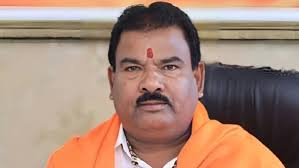Offering reward to ‘chop off’ Rahul Gandhi’s tongue to now punching canteen worker, Sanjay Gaikwad no stranger to controversies

Shiv Sena MLA Sanjay Gaikwad is once again in the headlines. This time, it’s for allegedly punching a canteen worker inside the Maharashtra Legislature. For many, this latest episode fits a familiar pattern. Gaikwad has been repeatedly involved in aggressive and inflammatory incidents over the years.
He represents Buldhana in Maharashtra and belongs to a party known for its bold and confrontational politics. But Gaikwad often takes things further than his colleagues. His outbursts have ranged from verbal threats to physical violence. This behavior raises questions about the standards expected from elected representatives.
From Local Leader to National Infamy
Gaikwad rose through the ranks of Shiv Sena with a reputation for being fearless and outspoken. Over time, his comments and actions started crossing lines. What began as fiery speeches gradually turned into threats and intimidation. Supporters describe him as bold. Critics, however, say he is reckless and dangerous.
In 2020, Gaikwad sparked national outrage with a shocking statement. He reportedly offered a reward to anyone who would “chop off” Rahul Gandhi’s tongue. This came after Gandhi criticized the government over its handling of the migrant crisis during the pandemic.
Leaders across party lines condemned the remark. Legal experts also expressed concern. They warned that such language could incite violence. Yet no serious action was taken against Gaikwad. His party distanced itself from the comment, but he continued his political journey without consequences.
A Fresh Assault Allegation
In July 2025, Gaikwad allegedly assaulted a canteen worker at the state legislature. According to eyewitnesses, the MLA got into an argument over food service. The dispute escalated, and Gaikwad reportedly punched the staff member.
This incident has shocked many. Opposition leaders staged a walkout in protest. Civil rights groups have also demanded accountability. They believe Gaikwad’s behavior reflects deeper issues in political culture.
The government has not yet launched an official probe. However, the pressure to take action is building quickly. The canteen worker was taken to the hospital with minor injuries. His family has filed a police complaint, hoping for justice.
Recurring Pattern of Aggression
This is not an isolated incident. Gaikwad has been in trouble before for using threats and strong-arm tactics. He has verbally attacked officials, political rivals, and even citizens. These actions are often ignored or dismissed as part of his “style.”
Observers note a troubling trend. Politicians like Gaikwad seem to thrive on controversy. Their aggressive image often boosts their local popularity. It helps them appear tough, especially in regions where people feel neglected or angry with the system.
Why Gaikwad Courts Controversy
Several factors explain why controversy seems to follow him:
- Political Branding: Gaikwad uses aggression as a tool to build a strongman image.
- Media Amplification: Outrageous acts grab media attention, giving him free publicity.
- Lack of Accountability: Past incidents didn’t lead to meaningful punishment.
- Populist Appeal: In some areas, voters see aggressive leaders as protectors of their rights.
This combination allows leaders like Gaikwad to operate with impunity. Each controversy adds to their notoriety. But it also erodes public trust in democratic institutions.
Reflections on India’s Political Culture
Gaikwad’s case isn’t just about one man. It reflects a larger problem in Indian politics—the growing normalization of violence and hate speech. Elected officials have a duty to lead with integrity. But too many are rewarded for shocking behavior rather than punished.
When lawmakers make threats or assault staff, it sends a dangerous message. It tells citizens that the powerful are above the law. It also damages the dignity of public institutions.
If this pattern continues, India’s democracy could suffer lasting harm. Respect for laws and values must come from the top.
Will This Be a Turning Point?
There are now growing calls for action. The Opposition wants a formal ethics inquiry. Activists and citizens are demanding that the Assembly suspend Gaikwad. They believe that failure to act will set a terrible precedent.
So far, Shiv Sena has not responded strongly. With state elections on the horizon, the party may be reluctant to anger a powerful MLA. Gaikwad controls significant local support in Buldhana. For some party leaders, political survival may matter more than principles.
Legal experts believe an FIR is likely. But securing a conviction could take years. And without pressure from within the legislature, little may change.
Conclusion
Sanjay Gaikwad’s actions continue to test the boundaries of acceptable political behavior. From threatening a national leader to allegedly punching a staff member, his pattern of aggression is clear. Yet the system around him has allowed this to go unchecked.
This moment could be a turning point—if leaders choose to act. Real accountability, however, requires courage from those in power. Until that happens, people like Gaikwad will continue to believe they are untouchable.
And India’s democracy will continue to bear the cost.






